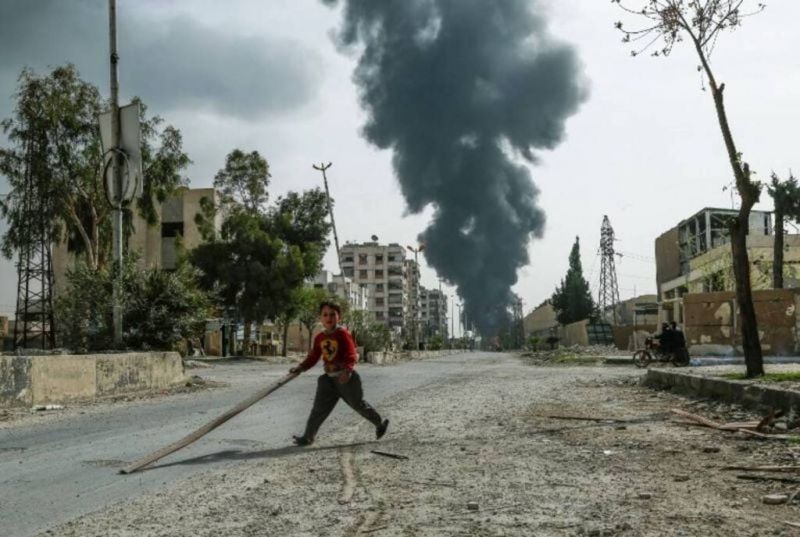
Douma, the main town in eastern Ghouta, under bombardment, March 20, 2018. (Credit: Hassan Mohammed/AFP)
Photos circulated at the time showed dozens of lifeless bodies laid side by side in makeshift hospitals, with no trace of blood on them. Other residents of Ghouta died while they slept.
When the outbreak of the Syrian revolution over ten years ago, this region on the outskirts of Damascus was a stronghold of resistance to the brutal Assad regime. With the state heavily bombarding the area, eastern Ghouta was completely besieged in April, and aerial raids, surface-to-surface missiles and artillery fire continued unabated.
Four months later, as UN investigators later confirmed, the population fell victim to the first large-scale chemical weapons attack. In the middle of the night, shells loaded with sarin gas, a powerful neurotoxin lethal at very low doses, suffocated the inhabitants.
According to US estimates, at least 1,429 people, including 426 children, were killed.
Ten years later, Anas, a former resident of Douma, the main city in eastern Ghouta, in exile in Turkey since 2019, recalls the day of the massacre.
“On the eve of the 21st, I was in one of the hospitals in Douma. We were living by the rhythm of almost daily bombings the regime launched against the Free Syrian Army [FSA, then the main armed force of the Syrian uprising]. During a raid, one of my friends was injured by a bomb. His family, who lived in Damascus, called me, frightened, asking me to take care of him. My father and brother both tended their shops, and I was the only one who could help him. On the night of the 20th-21st, around 4 or 5 AM, I left the hospital to smoke a cigarette. Out of nowhere, a man driving like crazy stopped with six badly injured survivors.
“He started shouting: ‘They are attacking the southeastern Ghouta with chemical weapons.’ The residents were on the brink of death. The driver asked for help and for me to follow him. I rushed into the hospital to warn my friend. The victims kept coming. A second car arrived, carrying even more injured people than the previous one. Foam was coming out of their mouths. A doctor asked me to put a hand-held fan on the mouth of a victim to [ventilate] them. I did, but 15 or 20 minutes later, my whole face turned blue and I started losing control. I felt my legs starting to tremble. I realized that the victim's breath was reaching my face.
“‘What's happening to you?’ my friend asked.
“A few minutes later, a new car arrived. Some of the passengers were injured, others already dead. A smell started spreading inside the hospital.
“This time it was my friend shouting, ‘I can't breathe anymore.’.
“That's when I understood what was happening. A doctor ordered us to leave the place and call someone to take care of my friend at his home. I still remember his words:
“‘What we're breathing is sarin gas! It will kill us.’
“So, I called my uncle, who brought both of us back home. At that moment, about a hundred people were between life and death. The hospital couldn’t admit the large number of victims flooding in. When I got home, my family forbade me from going back to the hospital. I was only 15 years old and didn’t know what a chemical weapons attack was. It was unimaginable. We were all petrified. Even today, I remember every detail.
“Of course, all the years I spent in eastern Ghouta since 2011 were horrible. It didn't stop on August 21st, but we never imagined a chemical attack would happen. There were so many victims that day ... Everyone was terrified. Two years later, on Dec. 26, 2015, I was seriously injured in an airstrike. I've since lost the use of my right hand. I stayed a few more years before fleeing eastern Ghouta in late April, 2018. The whole region had [by that point been] returned to regime control.”
The Syrian army carried out a chlorine attack on a residential neighborhood of Douma on April 7, 2018, killing several dozen civilians.
“Douma was the last area to be reclaimed by force. After the chemical attack that struck my city in April , the regime sent buses to clear out the rebel fighters and send them to northern parts of the country. I fled with my mother, my little brother, one of my sisters, and her family to a town near Aleppo. I was looking for effective treatment for my right arm but my surgery went wrong. I left on my own in mid-2019 to Gaziantep, Turkey. I'm still looking for treatment for my arm and a better economic situation. My father is still in eastern Ghouta. One of my brothers was arrested by the regime at the end of 2013. I still hope he's alive.”
*The informant’s name has been changed for his personal safety.
This story originally ran in French in L’Orient-Le Jour.